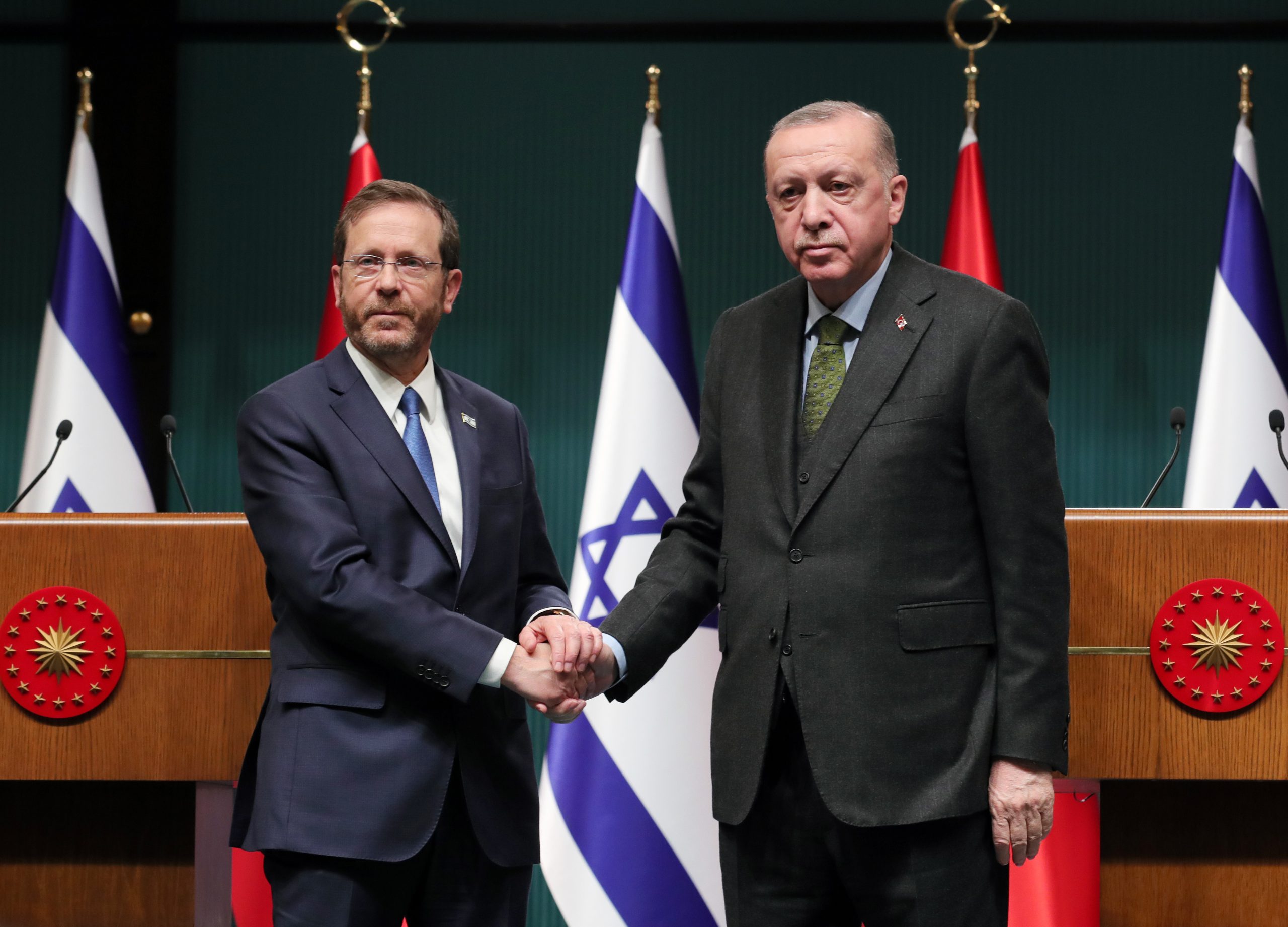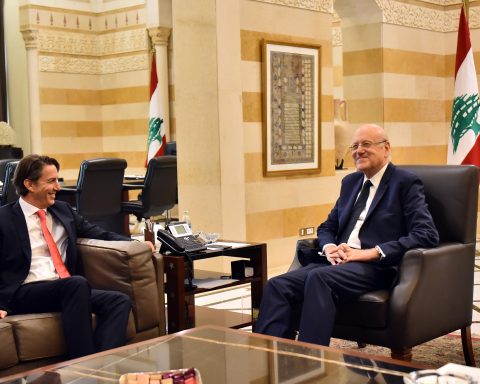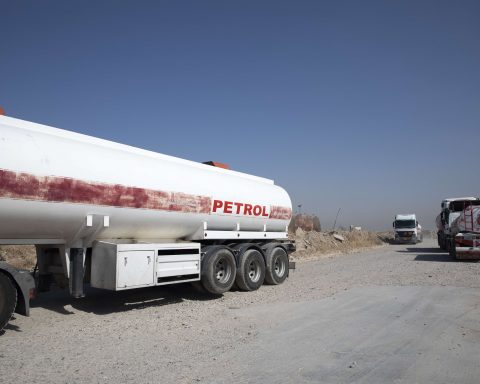2021 has been recorded as a year in which significant new developments took place in Turkey-Israel relations. After the appointment of Isaac Herzog, who has a moderate position on the two-state solution, after the presidential elections held in Israel in June, the relations between the two countries entered a new era. The leaders of both states, who made phone calls on different occasions after Herzog took office, were warmly interested in making “a new start” in bilateral relations. Against this backdrop, it was announced by Turkish President Recep Tayyip Erdogan that Israeli President Herzog would visit Turkey on March 9-10. The development of relations between the two countries was stated to be important both for the relations of the two countries and for regional stability and peace. The visit made by Herzog to Turkey on March 9-10 in order to realize the potential of cooperation in various fields, especially in economic and commercial relations, was defined as a ‘new beginning’ in relations by the leaders. As the first Israeli leader to visit Turkey since 2008, Herzog’s visit was closely followed by both the Israeli and Turkish public. During the visit, the two leaders pointed out “the necessity of reviving a political dialogue between two countries based on respect, common interests, and mutual sensitivities.”
One of the main agenda items of the visit by Israeli President Herzog was the economy and commercial relations. As a matter of fact, despite the political problems between the two countries, this area emerges as the one where the relations are the most stable. Despite the COVID-19 pandemic, trade volume increased by 36 percent and reached the level of $8.5 billion in 2021, and this situation is likely to be increased further in 2022 with the joint efforts of the two countries. It was pointed out that the two countries, which have the potential to cooperate in the fields of tourism, science, advanced technology, agriculture, health, and the defense industry, should show their will to realize this potential. The meeting of a delegation of 90 people in Israel between March 5-8 by the Turkish Exporters’ Assembly was considered an important step at this point.
In bilateral trade and economic relations, along with the old items continued within the framework of the Free Trade Agreement signed in 1996, the most open area for cooperation currently stands out as the transportation of hydrocarbon reserves extracted from Israel to Europe. During the visit, President Erdogan underlined that Turkey is ready for energy cooperation as a country with experience and capacity in this regard. Until this time, Israel has made significant efforts to transport Israeli gas to Europe through the Eastern Mediterranean Gas Forum (EMGF) and EastMed projects. In this process, the transportation of Israeli gas to Europe via the pipelines located in Turkey, which is currently the most reasonable route, has emerged as a new dynamic in relations between the two countries. However, Israel got closer to Egypt, Greece, and the Greek Cypriot Administration, which borders the Eastern Mediterranean rather than Turkey. Pointing out that Arab countries used their hydrocarbon reserves as a political trump card against western countries until the 1973 Oil Crisis, the Israeli administration considers the delivery of the reserves to Europe as a factor that will increase Israel’s strategic value. Since the hydrocarbon reserves in Israel are considered a counterbalance to the Arab countries, they are also viewed from a political perspective as well as their economic contribution. However, the announcement by the US authorities to the related actors in January 2022 to withdraw their support from the EastMed project in order to promote environmental projects brought the question to the fore of whether a new momentum could be achieved in the transportation of Israeli gas through Turkey.
The war initiated by Russia against Ukraine brought the issue of diversification of natural gas supplies to Europe back on the agenda again. Before the war, if Israeli gas was transported to Europe through the existing pipelines in Turkey, it could be thought that this new gas would relieve Europe to some extent. However, in the process, it was seen that while Europe favored the EastMed project, it did not support the Turkey route, which was considered to be more economical and feasible. On the other hand, the difficulty of realizing the EastMed route became evident after an agreement was signed between Turkey and Libya’s Government of National Accord. Israel has not invested heavily in both the EMGF and the EastMed project, which so far indicates that Israel, one of the important actors in the project, is also suspicious of these cooperation and project processes. Even if a pipeline project is already decided between Turkey and Israel, it will take time to realize the project and turn it into a significant strategic gain. On the other hand, the inadequacy of Israeli gas to meet the needs of Europe makes it necessary to add the gas extracted from the countries of the region to this line. During Herzog’s visit, President Erdogan stated that Turkey has four drilling vessels, one of which is under construction, and two seismic research vessels, and these vehicles and equipment can contribute to the cooperation between Turkey and Israel in the gas field. After the coup in Egypt in 2013 during the Arab Spring, the explosions around the pipeline between Israel and Egypt caused Israel to realize the importance of stable economic and political relations in the construction and operation of the pipeline. Since the project needs to progress on solid ground in the political relations between the two countries, the leaders are in search of stability in political relations.
The Israeli administration, which problematizes Turkey’s Hamas policies, is aware that it will not change Turkey’s current position. Turkey underlined that the Israeli administration should stay away from policies that would jeopardize the two-state solution, end its ‘provocative and aggressive attitude’ towards the Al-Aqsa Mosque and Jerusalem, and facilitate the continuation of the activities of TIKA and the Turkish Red Crescent, which carry out activities in the Palestinian region and Israel to improve the living conditions of the Palestinians. Although Israel’s Palestinian policies are constantly criticized by Turkey, it is obvious that the new government has not put forward a game-changing policy regarding both settlements and the two-state solution. This means that the political problems in bilateral relations will continue in a similar way. As a matter of fact, both Erdogan and Herzog stated that the two countries have issues that are difficult to reconcile, and therefore it is necessary to set a positive agenda between the two countries.
The US, which maintained its military and political dominance in the Eastern Mediterranean in the post-Cold War period through the US 6th Fleet, continued this process through the cooperation it established with Turkey, Israel, and Egypt. However, it is obvious that the region is facing significant difficulties in the new process, as this cooperation has been eroded to a great extent, especially as a result of the developments experienced during the 2011 Arab Spring process. At this point, it is seen that Israel, which has problematic relations with Turkey, emphasizes its cooperation with Egypt, the Greek Cypriot Administration, and Greece. However, the fact that the leaders in these countries constantly need to renew their trust in relations indicates the fragility of relations. As a matter of fact, Herzog announced that he would visit these countries before his visit to Turkey, Herzog’s visit to these countries was described as a reassurance visit. The fact that the Biden administration did not criticize the ‘gains’ achieved by Israel during the Donald Trump period, and, in addition, underlined that Israel has the right to defend itself during the May 9-10 Quds Day events, indicates that there is no significant difference in the US’ view of the process.
Although the withdrawal of the US from the EastMed project has been evaluated by some commentators as trying to bring Turkey and Israel closer, it would be more realistic to evaluate this development in terms of the US moving away from the problem areas and focusing on the Western Pacific against the growing influence of China and Russia. Since the realization of the project may cause difficulties in different areas, it is seen that the US focuses more on the future of NATO, which faces significant challenges. As a result of this situation, the US, which attaches importance to the position of both Turkey and Greece in NATO, looks at a new project like EastMed, which will bring new burdens, with reservations. At every opportunity, Turkey underlines the need to come together within the framework of international law, rather than through unilateral actions, on the creation of maritime jurisdiction areas and exclusive economic zones in the Eastern Mediterranean. In this context, the visits of the Turkish Ministers of Foreign Affairs and Energy to Palestine and Israel in the future are important, since the steps taken by the Greek Cypriot Administration in the context of the island of Cyprus lead to de facto situations that are difficult to reverse. It is likely that these visits will be instrumental in both revealing Turkey’s approaches to the Eastern Mediterranean in a more concrete way and catching important opportunities to re-establish the cooperation between the two countries in the field of energy, which was initiated before.














